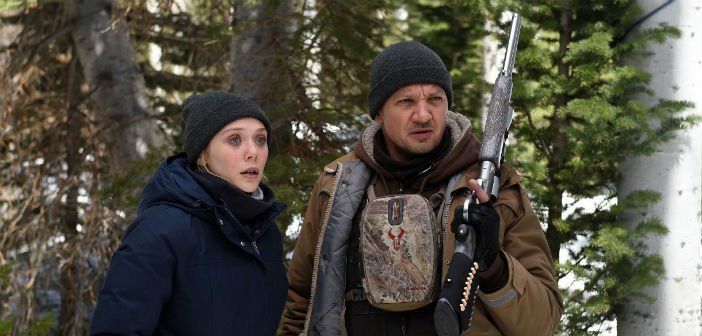After penning the critically acclaimed thrillers Sicario and Hell or High Water – the latter of which led to Oscar and Golden Globe nominations for Best Original Screenplay – Taylor Sheridan steps behind the camera for Wind River, a bleak and haunting story about a murder investigation on a snowy patch of Native American land in Wyoming. The deceased is Natalie (Kelsey Asbille), a teenage girl clad only in sweatpants and a jacket, but when the film opens she’s still very much alive, sprinting barefoot across the tundra to escape an unseen menace.
We don’t witness Natalie’s fate, but we see the aftermath when Fish and Wildlife officer Cory Lambert (Jeremy Renner) stumbles across the body while tracking a mountain lion that’s been preying on the local livestock. The severe head wound indicates foul play, so the FBI is notified, and Ben (Graham Greene), the local tribal police chief, is dismayed when help arrives in the form of Jane Banner (Elizabeth Olsen). Fresh off the plane from Las Vegas and clearly not prepared for the blizzard-like conditions – she doesn’t even have a windbreaker – Jane recognizes that she’s out of her depth, and enlists Cory’s help in piecing together the clues to find out what happened to Natalie.
As with his previous efforts, Sheridan’s screenplay wastes little time on exposition, instead dropping us in on these characters and their lives and allowing us to discover their backgrounds and motivations based almost entirely on context clues. The only exception is a somewhat jarring flashback in the film’s third act, which details the events leading up to Natalie’s desperate escape attempt. On its own, the material is excellent, but its placement in the overall narrative feels somewhat out of place, and possibly even a bit unnecessary – there’s certainly an argument to be made for a less explicit reveal, as this erodes some of the intrigue of the film’s central mystery.
Also reminiscent of Sheridan’s past work, Wind River is characterized by long periods of tension that finally erupt into bursts of violence. But unlike the stylized gunplay showcased in some of this year’s more action-oriented offerings, Sheridan is more interested in conveying the anxiety and fear that comes from being outgunned and outmatched. As a severely wounded character scrambles under a trailer and fumbles to reload, they’re forced to accept the very real possibility that they’re about to die, and the harrowing nature of this scenario (and others like it) will leave plenty of hearts pounding.

With the stoicism of a classic Western hero like Eastwood’s “Man With No Name” and a surprising amount of vulnerability lurking just below the surface, Renner has never been better than he is here. Tormented by the mistakes of his past, Cory takes a personal interest in solving Natalie’s case, and the mental and emotional toll it takes as the investigation continues is heartbreaking. The screenplay also does a great service to Olsen’s character, portraying Jane as resourceful and assertive and refusing to reduce her to a love interest or allow her inexperience to be a crutch. She and Renner make a great team, enjoying a wildly different dynamic than their previous onscreen collaborations in the Marvel films.
The unsettling nature of the crime and the dreary tone of the film itself may be a turnoff for some viewers – one elderly woman at my screening complained that it was too sad and too violent. But for audiences willing to accept that not every story needs to have a bright, cheerful ending, Wind River is another excellent contribution from a truly gifted storyteller with a particular talent for creating genuine, authentic characters that feel like they inhabit the same world as the rest of us. You won’t be laughing or smiling when you exit the theater, but you’ll almost certainly be affected by this tale.
Taylor Sheridan's tale of a murder investigation on a Native American reservation is a bleak, violent affair every bit as enthralling and tragic as his previous efforts.
-
Score9

